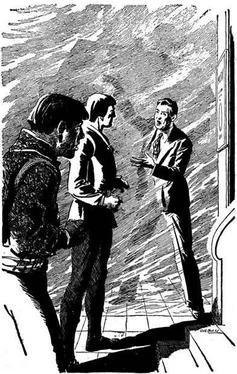Philip Dick - Exhibit Piece
Здесь есть возможность читать онлайн «Philip Dick - Exhibit Piece» весь текст электронной книги совершенно бесплатно (целиком полную версию без сокращений). В некоторых случаях можно слушать аудио, скачать через торрент в формате fb2 и присутствует краткое содержание. Жанр: Фантастика и фэнтези, на английском языке. Описание произведения, (предисловие) а так же отзывы посетителей доступны на портале библиотеки ЛибКат.
- Название:Exhibit Piece
- Автор:
- Жанр:
- Год:неизвестен
- ISBN:нет данных
- Рейтинг книги:3 / 5. Голосов: 1
-
Избранное:Добавить в избранное
- Отзывы:
-
Ваша оценка:
- 60
- 1
- 2
- 3
- 4
- 5
Exhibit Piece: краткое содержание, описание и аннотация
Предлагаем к чтению аннотацию, описание, краткое содержание или предисловие (зависит от того, что написал сам автор книги «Exhibit Piece»). Если вы не нашли необходимую информацию о книге — напишите в комментариях, мы постараемся отыскать её.
Exhibit Piece — читать онлайн бесплатно полную книгу (весь текст) целиком
Ниже представлен текст книги, разбитый по страницам. Система сохранения места последней прочитанной страницы, позволяет с удобством читать онлайн бесплатно книгу «Exhibit Piece», без необходимости каждый раз заново искать на чём Вы остановились. Поставьте закладку, и сможете в любой момент перейти на страницу, на которой закончили чтение.
Интервал:
Закладка:
EXHIBIT
PIECE
By Philip K. Dick
Illustrated by Paul Orban
As curator of the Twentieth Century Exhibit, George Miller felt that to do a good job he had to live his work. Then, one day, somebody got into his exhibit and he went to investigate ...
“THAT’S a strange suit you have I on” the robot pubtrans driver observed. It slid back its door and came to rest at the curb. “What are the little round things?”
“Those are buttons,” George Miller explained. “They are partly functional, partly ornamental. This is an archaic suit of the twentieth century. I wear it because of the nature of my employment.”
He paid the robot, grabbed up his briefcase, and hurried along the ramp to the History Agency. The main building was already open for the day; robed men and women wandered everywhere. Miller entered a PRIVATE lift, squeezed between two immense controllers from the pre-Christian division, and in a moment was on his way to his own level, the Middle Twentieth Century.
“Gorning,” he murmured, as Controller Fleming met him at the atomic engine exhibit.
“Gorning,” Fleming responded brusquely. “Look here, Miller. Let’s have this out once and for all. What if everybody dressed like you? The Government sets up strict rules for dress. Can’t you forget your damn anachronisms once in awhile? What in God’s name is that thing in your hand? It looks like a squashed Jurassic lizard.”
“This is an alligator-hide briefcase,” Miller explained. “I carry my study spools in it. The briefcase was an authority symbol of the managerial class of the latter twentieth century.” He unzipped the briefcase. “Try to understand, Fleming. By accustoming myself to everyday objects of my research period I transform my relation from mere intellectual curiosity to genuine empathy. You have frequently noticed I pronounce certain words oddly. The accent is that of an American business man of the Eisenhower administration. Dig me?”
“Eh?” Fleming muttered.
“Dig me was a twentieth century expression.” Miller laid out his study spools on his desk. “Was there anything you wanted? If not I’ll begin today’s work. I’ve uncovered fascinating evidence to indicate that although twentieth century Americans laid their own floor tiles, they did not weave their own clothing. I wish to alter my exhibits on this matter.”
“There’s no fanatic like an academician,” Fleming grated. “You’re two hundred years behind times. Immersed in your relics and artifacts. Your damn authentic replicas of discarded trivia.”
“I love my work,” Miller answered mildly.
“Nobody complains about your work. But there are other things than work. You’re a political-social unit here in this society. Take warning, Miller! The Board has reports on your eccentricities. They approve devotion to work...” His eyes narrowed significantly. “But you go too far.”
“My first loyalty is to my art,” Miller said.
“Your what? What does that mean?”
“A twentieth century term.” There was undisguised superiority on Miller’s face. “You’re nothing but a minor bureaucrat in a vast machine. You’re a function of an impersonal cultural totality. You have no standards of your own. In the twentieth century men had personal standards of workmanship. Artistic craft. Pride of accomplishment. These words mean nothing to you. You have no soul—another concept from the golden days of the twentieth century when men were free and could speak their minds.”
“Beware, Miller!” Fleming blanched nervously and lowered his voice. “You damn scholars. Come up out of your tapes and face reality. You’ll get us all in trouble, talking this way. Idolize the past, if you want. But remember—it’s gone and buried. Times change. Society progresses.” He gestured impatiently at the exhibits that occupied the level. “That’s only an imperfect replica.”
“You impugn my research?” Miller was seething. “This exhibit is absolutely accurate! I correct it to all new data. There isn’t anything I don’t know about the twentieth century.”
Fleming shook his head. “It’s no use.” He turned and stalked wearily off the level, onto the descent ramp.
Miller straightened his collar and bright hand-painted necktie. He smoothed down his blue pinstripe coat, expertly lit a pipeful of two-century-old tobacco, and returned to his spools.
Why didn’t Fleming leave him alone? Fleming, the officious representative of the great hierarchy that spread like a sticky gray web over the whole planet. Into each industrial, professional, and residential unit. Ah, the freedom of the twentieth century! He slowed his tape scanner a moment, and a dreamy look slid over his features. The exciting age of virility and individuality, when men were men...
It was just about then, just as he was settling deep in the beauty of his research, that he heard the inexplicable sounds. They came from the center of his exhibit, from within the intricate, carefully-regulated interior.
Somebody was in his exhibit.
He could hear them back there, back in the depths. Somebody or something had got past the safety barrier set up to keep the public out. Miller snapped off his tape scanner and got slowly to his feet. He was shaking all over as he moved cautiously toward the exhibit. He killed the barrier and climbed the railing onto a concrete sidewalk. A few curious visitors blinked, as the small, oddly-dressed man crept among the authentic replicas of the twentieth century that made up the exhibit and disappeared within.
Breathing hard, Miller advanced up the sidewalk and onto a carefully-tended gravel path. Maybe it was one of the other theorists, a minion of the Board, snooping around looking for something with which to discredit him. An inaccuracy here—a trifling error of no consequence there. Sweat came out on his forehead; anger became terror. To his right was a flower bed. Paul Scarlet roses and low-growing pansies. Then the moist green lawn. The gleaming white garage, with its door half up. The sleek rear of a 1954 Buick—and then the house itself.
He’d have to be careful. If it was somebody from the Board he’d be up against the official hierarchy. Maybe it was somebody big. Maybe even Edwin Carnap, President of the Board, the highest ranking official in the N’York branch of the World Directorate. Shakily, Miller, climbed the three cement steps. Now he was on the porch of the twentieth century house that made up the center of the exhibit.
It was a nice little house; if he had lived back in those days he would have wanted one of his own. Three bedrooms, a ranch-style California bungalow. He pushed open the front door and entered the livingroom. Fireplace at one end. Dark wine-colored carpets. Modern couch and easy chair. Low hardwood glass-topped coffee table. Copper ashtrays. A cigarette lighter and a stack of magazines. Sleek plastic and steel floor lamps. A bookcase. Television set. Picture window overlooking the front garden. He crossed the room to the hall.
The house was amazingly complete. Below his- feet the floor furnace radiated a faint aura of warmth. He peered into the first bedroom. A woman’s boudoir. Silk bed cover. White starched sheets. Heavy drapes. A vanity table. Bottles and jars. Huge round mirror. Clothes visible within the closet. A dressing gown thrown over the back of a chair. Slippers. Nylon hose carefully placed at the foot of the bed.
Miller moved down the hall and peered into the next room. Brightly painted wallpaper: clowns and elephants and tight-горе walkers. The children’s room. Two little beds for the two boys. Model airplanes. A dresser with a radio on it, pair of combs, school books, pennants, a No Parking sign, snapshots stuck in the mirror. A postage stamp album.
Читать дальшеИнтервал:
Закладка:
Похожие книги на «Exhibit Piece»
Представляем Вашему вниманию похожие книги на «Exhibit Piece» списком для выбора. Мы отобрали схожую по названию и смыслу литературу в надежде предоставить читателям больше вариантов отыскать новые, интересные, ещё непрочитанные произведения.
Обсуждение, отзывы о книге «Exhibit Piece» и просто собственные мнения читателей. Оставьте ваши комментарии, напишите, что Вы думаете о произведении, его смысле или главных героях. Укажите что конкретно понравилось, а что нет, и почему Вы так считаете.








